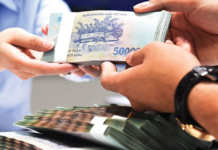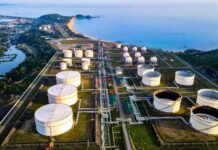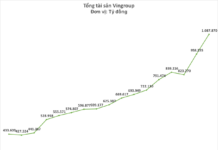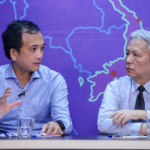
Deputy Director of the Electricity Bureau Trinh Quoc Vu in discussion with Dr. Nguyen Si Dung. (Photo: VGP)
At the seminar on “Sustainable Development of the Electricity Industry – The Issues at Stake” organized by the Government Portal, Mr. Trinh Quoc Vu, Deputy Director of the Electricity Bureau (Ministry of Industry and Trade), said that it is necessary to first clarify which reasonable and legitimate costs of the Vietnam Electricity Group (EVN) have not been accounted for and fully calculated into the retail electricity price.
In 2022 and 2023, the geopolitical conflict between Russia and Ukraine caused a significant upheaval in the world’s primary energy market, specifically an unusual spike in prices.
For example, with coal, we have only partially achieved self-sufficiency for electricity production, while the proportion of imported coal for power plants continues to rise, reaching about 40-50% and is expected to increase further.
In 2022, coal prices surged by 163% compared to 2021, with certain months, such as April 2022, witnessing a staggering 411% increase, jumping from 138 USD/ton to 705 USD/ton.
“The significant fluctuations in primary fuel prices will be reflected in the electricity generation cost through the power purchase agreement, which is adjusted based on the input fuel prices,” emphasized Mr. Vu.
While the increase in gas prices was relatively lower at 27.4% compared to 2021, the overall fuel price level in 2023 remained higher than in 2022 and significantly exceeded the fuel price level in 2021.
This led to a substantial rise in EVN’s electricity procurement costs from various sources, especially those utilizing fossil fuels, including coal, gas, and oil.
According to Mr. Trinh Quoc Vu, approximately 30% of the electricity generation mix comes from hydropower, while solar and wind power contribute about 12%.
Regarding the legal and political basis, we have the Electricity Law of 2024. The law clearly states that the retail electricity price must reflect and promptly adjust to the actual changes in input parameters, covering reasonable costs, legitimate expenses, and appropriate profits to preserve and develop the business capital of enterprises, aligning with socio-economic conditions and the pace of market competition.
Law No. 68 on State Capital Management and Investment in Enterprises also stipulates that enterprises are responsible for preserving and developing capital. As a state-owned enterprise, EVN, with 100% state capital, is responsible for preserving and developing state capital in the enterprise.
Notably, Resolution 70 of the Political Bureau, issued recently, clearly mandates the enhancement of autonomy, self-decision, and accountability of enterprises. It also calls for reviewing and supplementing specific mechanisms and policies to facilitate and ensure capital for state-owned corporations and enterprises to develop and exploit large-scale, critical, and urgent energy projects.
Resolution 70 also puts forth a clear requirement to put an end to the situation of state-owned enterprises delaying payments to private enterprises according to signed contracts or agreements.
In the future, EVN faces a significant task, as assigned by the Government, to invest in various power sources, including the Ninh Thuan 1 nuclear power plant and the large-scale Bac Ai Pumped Storage Hydro Power Plant, to balance the capacity of sources, loads, and wind and thermal power in Quang Trach.
EVN requires a healthy financial situation to access loans, not only from domestic credit institutions but also from international sources.
“We believe that the present is the opportune time to amend and supplement Decree No. 72 to enable EVN to promptly account for electricity production costs, ensuring accuracy and completeness in electricity pricing,” Mr. Vu emphasized.
“EVN Takes a ‘Hit’ Rather Than a Loss”
As of late 2023, EVN faced a significant deficit in its finances, according to Trinh Quoc Vu, Deputy Director of the Electricity Authority under the Ministry of Industry and Trade. This deficit, commonly referred to as cumulative losses, amounted to a staggering 50,000 billion VND, excluding exchange rate differences. This discrepancy between revenue and expenses will inevitably require EVN to accurately reflect these costs in electricity prices.
Unraveling EVN’s Colossal Loss: A Request for Transparency on the $44 Billion Deficit Impacting Electricity Rates
“The feedback from various ministries and associations on Decree 72/2025, crafted by the Ministry of Industry and Trade, proposes supplementary regulations regarding costs not factored into electricity prices. This feedback is a crucial step in shaping the decree and ensuring a comprehensive approach to electricity pricing.”
The Great Russian Retail Rush: Vietnam’s 5% Import Tax Advantage Makes it the 5th Largest ‘Shark’ in the World.
“Russia’s National Treasures: A Russian Extravaganza in Vietnam.
Throughout this year, Vietnam has witnessed an influx of Russia’s national treasures at incredibly attractive prices. A veritable feast of Russian culture and history has been on offer, captivating and intriguing locals and tourists alike.”










































